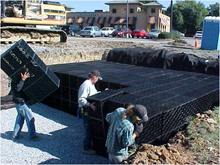Starting in October, MPC's Josh Ellis will be working toward two certificates through the Chicago Center for Green Technology’s Green Tech U program. Green Tech U’s free workshops and seminars provide anyone with the opportunity to increase their knowledge of green technology, sustainability, and public policy, meet people with similar interests, and expand their personal and professional networks. View the complete Fall 2011 brochure or just view the Fall 2011 Green Tech U seminar listing. In this blog series, Josh will recap his experiences as they relate to MPC's mission and work.
Several weeks ago I decided that with fall and winter looming (despite all evidence to the contrary the last week or so), I would spend a handful of otherwise cold and dark evenings doing something useful indoors, namely, taking courses through the Chicago Center for Green Technology’s Green Tech U program. Their array of programming piqued my personal and professional curiosity, and the price was right ($0 registration fee, though of course we all pay for these courses through municipal taxes, another reason we should take advantage of them).
Purely by coincidence, the first course in the engineering and building/construction management tracks that I was both interested in and able to attend was last night's "Chicago Does Water Harvesting!" It happens to be a subject I know fairly well as a result of three years of ultimately frustrating work to pass legislation that would require an update to the Ill. State Plumbing Code enabling the reuse of rainwater for things like flushing toilets. We've come close three times, but in the end could not get the bill passed. As a result, there is no set of standards for licensed plumbers to follow when installing these systems, and so every single rainwater reuse project proposed in the state has to be presented to the Ill. Dept. of Public Health in order to get a variance and approval to move forward. So while it is possible to build a rainwater harvesting system, it requires an additional hurdle that some property owners may be reluctant to attempt. In the end, this lack of minimum standards depresses the potential marketplace for rainwater harvesting systems. This is unfortunate, because between rising costs of providing public water supplies, mounting stormwater challenges, demand for LEED buildings, and the simple need to create jobs wherever possible ... rainwater harvesting for non-potable uses just makes a heck of a lot of sense.
That said, projects are still getting built, largely by property owners with a strong incentive to go the extra mile to secure a variance. John Bauer, president of Hinsdale-based Wahaso, led the course (John also spoke at an MPC-Openlands roundtable several months ago.) He opened with a basic explanations of how water harvesting systems worked, and then provided examples of four recent projects his firm has worked on.
Chicago's Public Buildings Commission is trying to incorporate as much water harvesting as possible into new buildings, including the Valley Forge Fieldhouse. The only real demand for non-potable water at the fieldhouse is toilet flushing, and the rainwater collected off the roof is a more than sufficient supply for that. While a back-up connection to the municipal water pipes is in place, since installing the rainwater harvesting system the fieldhouse hasn't flushed a drop of municipal potable water down the toilet. Pretty impressive. They used a modular, permeable underground storage tank from an Australian firm called Atlantis, and it's one of the cooler things I've seen recently.

It only looks like a stack of lobster traps... in fact it's a modular water storage tank.
Wahaso
You can build the storage tank to your specifications, wrap it in a permeable liner, and cover it in sand. That's really it. Comparable systems have been installed at other Chicago Parks District facilities, as well as the Field's Volvo Dealership in Northfield, Ill. (You can see above-ground rainwater harvesting tanks in the background on the web site; they also have a larger undergound tank, and installed solar and wind power systems, as well as permeable paving.)
Wahaso also worked at the Harold Washington Social Security Center building in downtown Chicago. Their water harvesting system captures rainwater, collects water from the sump pump, and most significantly, prevents the condensate from the air conditioning system from running into the sewer. Condensate — remember that air conditioning systems pull water vapor out of the air as part of the cooling and humidity-reduction process — is almost pure water, and can be used for any number of things. Typically it runs into the sewer, and in a building the size of the Harold Washington Social Security Center, that air conditioner can produce an outflow of approx. 12 gallons a minute ... which adds up. The system at the center reuses those three water sources for toilet flushing and irrigation, but the vast majority of it used as cooling tower make-up water. You see these cooling towers atop many large buildings, and they use a lot of water, much of which evaporates, taking heat with it. No need to use potable water to do that. All told, the center saves 3.2 million gallons of potable water a year.
The class was a very interesting presentation featuring real case studies in rainwater (and other water) harvesting projects. I applaud the property owners, project managers, and design/engineering teams like Wahaso that have gone the extra mile to get a variance from the Ill. Dept. of Public Health in order build them, but we're going to keep working on simplifying the process.
My next class at Green Tech U is all about the City of Chicago Green Permit Program, which I know less about, but which will be an integral part of our upcoming green infrastructure program in Chicago's 35th Ward. As always, you can view the complete Fall 2011 Green Tech U brochure or just view the Fall 2011 Green Tech U seminar listing. Hope I see you in class.